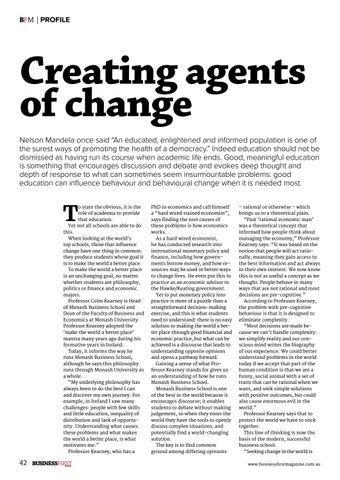BFM | PROFILE
Creating agents of change Nelson Mandela once said “An educated, enlightened and informed population is one of the surest ways of promoting the health of a democracy.” Indeed education should not be dismissed as having run its course when academic life ends. Good, meaningful education is something that encourages discussion and debate and evokes deep thought and depth of response to what can sometimes seem insurmountable problems: good education can influence behaviour and behavioural change when it is needed most.
T
o state the obvious, it is the role of academia to provide that education. Yet not all schools are able to do this. When looking at the world’s top schools, those that influence change have one thing in common: they produce students whose goal it is to make the world a better place. To make the world a better place is an unchanging goal, no matter whether students are philosophy, politics or finance and economic majors. Professor Colm Kearney is Head of Monash Business School and Dean of the Faculty of Business and Economics at Monash University. Professor Kearney adopted the ‘make the world a better place’ mantra many years ago during his formative years in Ireland. Today, it informs the way he runs Monash Business School, although he says this philosophy runs through Monash University as a whole. “My underlying philosophy has always been to do the best I can and discover my own journey. For example, in Ireland I saw many challenges: people with few skills and little education, inequality of distribution and lack of opportunity. Understanding what causes these problems and what makes the world a better place, is what motivates me.” Professor Kearney, who has a
42 BUSINESSFIRST MAGAZINE
PhD in economics and call himself a “hard wired trained economist”, says finding the root causes of these problems is how economics works. As a hard wired economist, he has conducted research into international monetary policy and finance, including how governments borrow money, and how resources may be used in better ways to change lives. He even put this to practice as an economic advisor to the Hawke/Keating government. Yet to put monetary policy into practice is more of a puzzle than a straightforward decision-making exercise, and this is what students need to understand: there is no easy solution to making the world a better place through good financial and economic practice, but what can be achieved is a discourse that leads to understanding opposite opinions and opens a pathway forward. Gaining a sense of what Professor Kearney stands for gives us an understanding of how he runs Monash Business School. Monash Business School is one of the best in the world because it encourages discourse; it enables students to debate without making judgement, so when they enter the world they have the tools to openly discuss complex situations, and potentially find a world-changing solution. The key is to find common ground among differing opinions
– rational or otherwise – which brings us to a theoretical plain. “Past ‘rational economic man’ was a theoretical concept that informed how people think about managing the economy,” Professor Kearney says. “It was based on the notion that people will act rationally, meaning they gain access to the best information and act always in their own interest. We now know this is not as useful a concept as we thought. People behave in many ways that are not rational and most decisions are pre-cognitive.” According to Professor Kearney, the problem with pre-cognitive behaviour is that it is designed to eliminate complexity. “Most decisions are made because we can’t handle complexity: we simplify reality and our conscious mind writes the biography of our experience. We could better understand problems in the world today if we accept that part of the human condition is that we are a funny, social animal with a set of traits that can be rational when we want, and seek simple solutions with positive outcomes, but could also cause enormous evil in the world.” Professor Kearney says that to protect the world we have to stick together. This line of thinking is now the basis of the modern, successful business school. “Seeking change in the world is www.businessfirstmagazine.com.au
